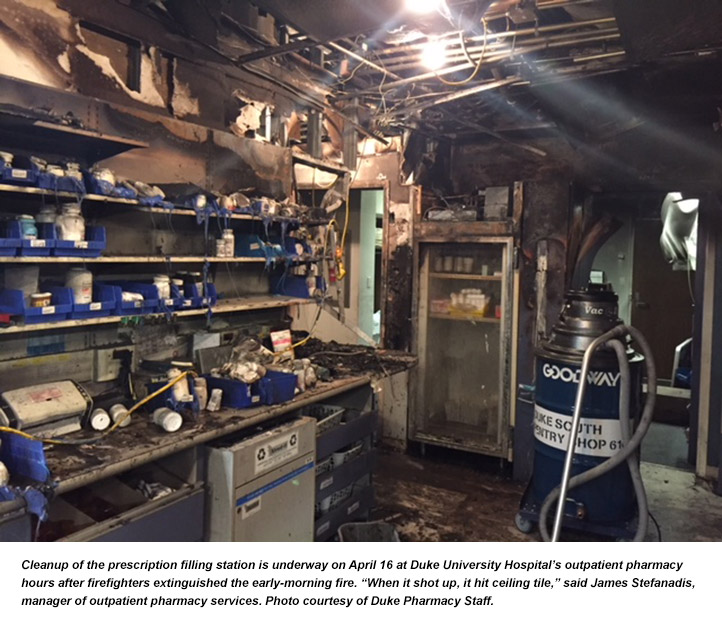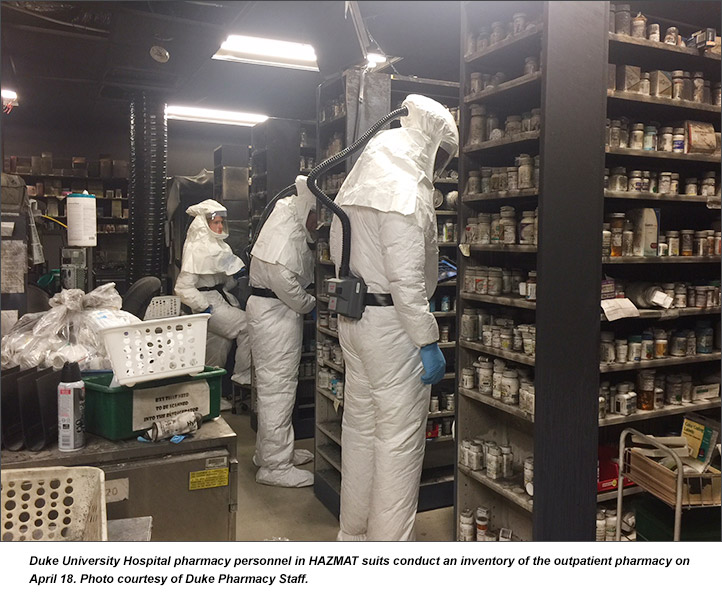

“We determined pretty quickly that space was not going to be useful,” Duke University Hospital’s Grayson Peek said of the damage to the outpatient pharmacy once firefighters allowed entry on April 16.
The pharmacy, according to a 5:51 a.m. post on the Durham (North Carolina) Fire Department’s Facebook page, “incurred heavy fire, heat, and smoke damage.”
Peek, manager of pharmacy business development and integrity, was among the first to see the damage that Monday, having been alerted to the fire through his role as the pharmacy department’s administrator on call.
He said he called outpatient pharmacy services manager James Stefanadis and Udobi Campbell, associate chief pharmacy officer for the hospital’s ambulatory care pharmacy services.
“If it wasn’t directly burned,” Campbell said, referring to the pharmacy’s inventory and equipment, “the heat was so much that nothing could be used.”
Peek said he, Campbell, and Stefanadis quickly began planning next steps, with a focus on preserving continuity of care for the outpatient pharmacy’s clientele.
Sending those patients and hospital employees to pharmacies outside Duke Health System was never a consideration, Campbell said.
The hospital’s outpatient pharmacy, she said, opened in 1977 and has remained in the same location, the first floor of a multilevel medical office building. She described the pharmacy as “very well appreciated by our patients and our providers who see patients in clinic.”
Patients and hospital employees were expecting the pharmacy, which Peek said dispensed about 300 prescriptions per day, to open at 8:30 a.m. after being closed over the weekend.
Stefanadis said a text message about the fire accompanied by a request to arrive early for work went out to the pharmacy’s staff about 5 a.m.
“Everybody came in pretty much early,” he said, referring to the 14 staff members scheduled to work that day. “We were fortunate also that we had some other staff members in the department of pharmacy who were able to come over and lend hands to help us move and come up with some logistics of how to operationalize a different location very quickly.”
Stefanadis said the plan that he, Campbell, and Peek devised that morning initially moved the process of filling prescriptions to 2 other department-managed locations on the Duke University Medical Center campus: Duke Cancer Center Specialty Pharmacy and Children’s Health Center Retail Pharmacy. Prescriptions for pickup by walk-ins were filled at the specialty pharmacy and brought to a conference room near the outpatient pharmacy. Prescriptions for bedside delivery to hospital patients before discharge were filled at the nearby health center.
Campbell said the plan to redirect patients to the campus’s other retail pharmacies was always considered as the default strategy in the event the outpatient pharmacy could not operate.
“But when you’re now looking at 6 months’ worth of interuption,” she said, “you wonder if that’s a sustainable backup plan to be able to maintain services for patients and not lose them,” given the inconvenience to them of having to visit a new site.
“For the most part,” said Stefanadis, “we didn’t miss a beat of filling prescriptions both Monday and Tuesday from the 2 different sites.”
He credited the “can-do attitude” of his staff and assistance from a wide range of hospital personnel, including those in carpentry, information technology, and telecommunications.
Also working in the department’s favor, Campbell said, was a cloud-based server supporting the outpatient pharmacy dispensing system, extra computer workstations with access to the dispensing system, and the 2 available conference rooms. Additionally, she stated, the department received support from the highest levels in the health system to continue outpatient pharmacy services.
Chief Pharmacy Officer Paul W. Bush said Stefanadis, Peek, Campbell, and numerous other people undertook a tremendous amount of work after the fire, making it possible for the department to “continue to take care of the patients flawlessly.”
In the aftermath of the fire, the department conducted an inventory and filed required reports with the state board of pharmacy, the Drug Enforcement Administration, and the hospital’s insurance company, Campbell said.
Peek said he and other pharmacy personnel who inventoried the outpatient pharmacy had the unusual experience of wearing HAZMAT suits.
Nearly every salvageable piece of paper in the pharmacy, including the Schedule II controlled substance inventory books, had been touched by smoke, Stefanadis said.
Disaster recovery personnel used an “ozone chamber” to remove smoke odor from the documents before moving them to storage, Campbell said.
Fire department authorities allowed pharmacy personnel to enter the pharmacy at 2:45 a.m. on April 16, which was a little more than 2 hours after firefighers responded to an automatic alarm at the medical office building.
Stefanadis said investigators quickly decided that the fire was likely of electrical origin but, as of May 1, had not determined the cause.
[This news story appears in the June 15, 2018, issue of AJHP.]









